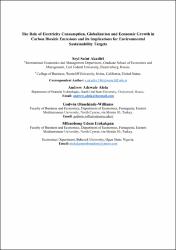| dc.contributor.author | Saint Akadiri, Seyi | |
| dc.contributor.author | Alola, Andrew Adewale | |
| dc.contributor.author | Olasehinde-Williams, Godwin | |
| dc.contributor.author | Etokakpan, Mfonobong Udom | |
| dc.date.accessioned | 2020-02-16T18:48:39Z | |
| dc.date.available | 2020-02-16T18:48:39Z | |
| dc.date.issued | 2020 | en_US |
| dc.identifier.issn | 0048-9697 | |
| dc.identifier.issn | 1879-1026 | |
| dc.identifier.uri | https://hdl.handle.net/11363/1994 | |
| dc.description | Accession Number: WOS:000506214900156
PubMed ID: 31806296 | en_US |
| dc.description.abstract | In spite of increased awareness and commitment to climate change, the world is yet to witness a dramatic downturn of pollutant emissions. With the strategic geographical location of Turkey and the country's energy and environmental degradation challenges, this study, therefore, attempts to investigate the linkages among carbon emissions, electricity consumption, economic growth and globalization in Turkey over the period 1970-2014. They posit a more robust interpretation within a multivariate arrangement by employing several econometric techniques such as the Bayer and Hanck (2013) cointegration procedure, the ARDL bounds testing approach to cointegration, ARDL short-run and long-run estimations, and the Toda-Yamamoto Granger causality testing. From our findings, the policy variables relevant to pollution reduction in Turkey are electricity consumption and economic growth, and the common factor to these policy variables is fossil fuel consumption. There is no statistical indication that globalization impacts carbon emissions in Turkey. Our findings have the following important policy implications for Turkey and other countries with high records of carbon emissions; (i) the so-called fossil fuel capitalism needs to be overhauled, and a switch to low carbon, eco-friendly, energy mix content is required, (ii) renewable energy sources should be prioritized, (iii) adoption of electric vehicles not as complements to internal combustion engine vehicles but as substitutes should be encouraged, (iv) levying of environmentally sensitive taxes and subsidies should be intensified, and (v) better participation in the global drive for decarbonization should be encouraged. In summary, we advocate extensive planning and financing, and coordinated action across economic sectors and various stakeholders to achieve a low-carbon energy system. | en_US |
| dc.language.iso | eng | en_US |
| dc.publisher | ELSEVIER, RADARWEG 29, 1043 NX AMSTERDAM, NETHERLANDS | en_US |
| dc.relation.isversionof | 10.1016/j.scitotenv.2019.134653 | en_US |
| dc.rights | info:eu-repo/semantics/openAccess | en_US |
| dc.rights | Attribution-NonCommercial-NoDerivs 3.0 United States | * |
| dc.rights.uri | http://creativecommons.org/licenses/by-nc-nd/3.0/us/ | * |
| dc.subject | Globalization | en_US |
| dc.subject | Electricity consumption | en_US |
| dc.subject | Carbon emission | en_US |
| dc.subject | Energy consumption | en_US |
| dc.subject | Economic growth | en_US |
| dc.subject | Turkey | en_US |
| dc.subject | CO2 EMISSIONS | en_US |
| dc.subject | ERROR-CORRECTION | en_US |
| dc.subject | TIME-SERIES | en_US |
| dc.subject | UNIT-ROOT | en_US |
| dc.subject | COINTEGRATION | en_US |
| dc.subject | TRILEMMA | en_US |
| dc.subject | SECTOR | en_US |
| dc.subject | TRADE | en_US |
| dc.subject | NEXUS | en_US |
| dc.title | The Role of Electricity Consumption, Globalization and Economic Growth in Carbon Dioxide Emissions and its Implications for Environmental Sustainability Targets | en_US |
| dc.type | article | en_US |
| dc.relation.ispartof | SCIENCE OF THE TOTAL ENVIRONMENT | en_US |
| dc.department | İktisadi İdari ve Sosyal Bilimler Fakültesi | en_US |
| dc.identifier.volume | 708 | en_US |
| dc.relation.publicationcategory | Makale - Uluslararası Hakemli Dergi - Kurum Öğretim Elemanı | en_US |



















